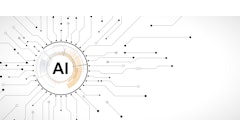
AI is transforming the ways that organizations carry out their work, from finance to HR and beyond. However, supply chains have been slower to adopt AI, especially for procurement processes.
Here are the Top 10 use cases for AI in procurement and the Top 5 benefits organizations are already seeing by leveraging it. These examples show that AI is not just a future possibility but a present-day advantage for the procurement teams who have already embraced it.
AI use cases in procurement
APQC finds that more than half of surveyed organizations (58%) have not yet implemented AI in procurement. Figure 1 shows the top use cases among the 42% that have implemented AI.
 APQC
APQC
Advanced spend analysis
Advanced spend analysis is the most popular use case for AI in procurement (78% of respondents who are using AI). Many AI tools available today can enhance spend analysis through:
» Automated spend classification: AI can accurately classify spend data into categories, handle structured or inconsistent descriptions, and continuously improve classification accuracy.
» Pattern and anomaly detection: AI-powered tools can detect unusual spending patterns, identify non-compliant spending, and flag duplicate or fraudulent transactions.
» Predictive spend forecasting: AI can use historical data and external signals to model the impact of business changes (e.g., new product launches) and forecast future spend by category, supplier, or business unit.
These features enable deeper insights, provide predictive capabilities, and support strategic decision-making in procurement.
Sourcing insights
Leveraging AI for sourcing insights is the second most common use case for AI in procurement. For example, AI can:
» Discover and evaluate suppliers
» Provide intelligence about markets and pricing
» Simulate the impact of different sourcing scenarios
Features like these support smarter, faster, and more strategic sourcing decisions.
Pricing insights
Organizations also commonly use AI for pricing insights. AI can track the real-time prices of goods and services from suppliers and marketplaces and alert buyers to price fluctuations or opportunities for renegotiation. AI can also provide:
» Predictive pricing models by forecasting future prices based on historical trends, seasonality, and external factors
» Total cost of ownership (TCO) analysis, including logistics, maintenance, warranty, and lifecycle costs in addition to unit price. AI can also compare TCO across suppliers or product options.
» Negotiation support by recommending target prices and suggesting negotiation levers (e.g., volume discounts, bundled services)
AI is already transforming procurement through these and other uses cases like guided vendor onboarding, procurement analytics, contract risk analysis, and more.
Benefits of AI in procurement
Respondents from organizations that have already implemented AI in procurement said that their organization experienced improved data quality, improved decision making, increased savings, scaled expertise, and reduced contract leakage (Figure 2).
 APQC
APQC
Improved data quality
Eight out of every 10 respondents who implemented AI in procurement said that they experienced improved data quality. AI can now perform data cleansing and standardization work to detect and correct errors (e.g., typos, inconsistent units), standardize formats, merge duplicates, and leverage external sources to fill in missing fields. This helps to keep bad data out of the system and supports more effective master data management. Reliable, high-quality data enables AI to predict future demand with a higher degree of accuracy, optimize order quantities and timing, reduce excess inventory, and help organizations avoid stockouts.
Improved decision making
Many of the benefits of AI are interconnected and related. For example, better data quality enables improved decision making, the second most common benefit of AI for procurement. Features like advanced spend analysis help to drive better decision making by allowing procurement functions to more easily categorize spend data, identify spend patterns, evaluate supplier performance, and monitor delivery performance. Using these inputs alongside scans of current news and social media, AI can also predict some disruptions before they occur, providing a vital early warning system that gives organizations more time to respond.
Increased savings
AI can drive increased savings by optimizing processes, improving decision-making, and uncovering hidden inefficiencies. For example:
» AI can analyze historical spend data to identify maverick spending, duplicate purchases, and non-compliant suppliers and highlight volume discounts or consolidation opportunities.
» AI tools can monitor real-time market prices and trends and alert buyers to price drops or better deals.
» Automation powered by AI helps to lower administrative costs and shrink cycle times.
Scaled expertise
AI helps procurement to scale its expertise by amplifying the capabilities of procurement professionals across the organization, even when resources are limited. Specifically, AI can:
» Encode procurement best practices, policies, and category knowledge
» Provide real-time guidance to non-experts during sourcing, contracting, or negotiations
» Offer recommendations based on historical data and market intelligence
» Act as a virtual advisor for decision support by analyzing complex trade-offs, simulating the outcomes of different sourcing strategies, and recommending optimal decisions based on goals and constraints
» Automate routine tasks (e.g., purchase order creation, invoice matching, supplier onboarding) to free up professionals for more strategic, high-value work
Reduced contract leakage
Almost half of respondents (48%) said that AI helped to reduce contract leakage in procurement. AI helps organizations achieve this benefit by:
» Analyzing contract terms
» Flagging non-compliant or risky clauses in a contract
» Recommending standardization across contracts
These forms of support help procurement to get the most value out of contracts, while also lowering costs and saving time.
Key takeaways
The benefits of AI for procurement are increasingly coming into focus. AI is already helping early adopters to work faster and with greater accuracy, gain deeper visibility into supplier performance, proactively mitigate risk, and more.
Many issues around technology in procurement (and especially AI) are still evolving. For example, many organizations still need to wrestle with privacy and ethical concerns, put governance in place, and establish processes to verify and validate outputs to implement and use AI effectively. While fewer than half of respondents have adopted AI for procurement, that adoption will continue growing as organizations put these foundational elements in place.




















